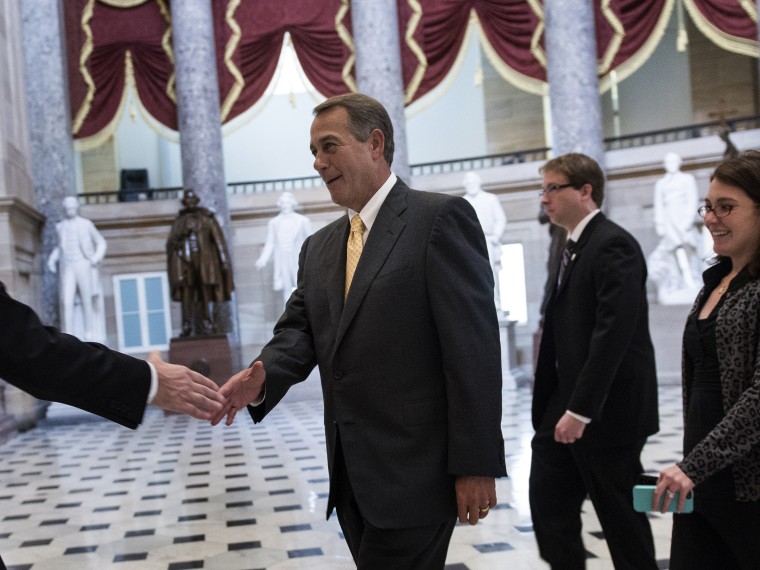test
A few things about House Speaker John Boehner (R-Ohio) have become clear in recent weeks. We've learned, for example, that he'll take orders from far-right extremists in his caucus. We've also learned he's willing to shut the federal government down in the hopes of taking away health care benefits from millions of Americans.
What's been far less clear is where, exactly, the flailing House Speaker intends to go with all of this. Does he have an end-game in mind? Is there any strategy at all?
Following up on a segment from last night's show, the answer is: maybe. Robert Costareported late yesterday, Boehner apparently has a "grand" idea.
House Republicans tell me Speaker John Boehner wants to craft a "grand bargain" on fiscal issues as part of the debt-limit deliberations, and during a series of meetings on Wednesday, he urged colleagues to stick with him.The revelation came quietly. Boehner called groups of members to his Capitol office all day, taking their temperature on the shutdown and the debt limit. It became clear, members say, that Boehner's chief goal is conference unity as the debt limit nears, and he's looking at potentially blending a government-spending deal and debt-limit agreement into a larger budget package."It's the return of the grand bargain," says one House Republican, who requested anonymity to speak freely.
As part of this process, Boehner has reportedly recruited leading Republican committee chairs, Paul Ryan and Dave Camp, to help persuade GOP lawmakers (who don't seem especially interested in what the Speaker has to say).
Let's pause to note the significance of this microcosm: there are budget discussions underway behind closed doors, with conservative Republicans hoping to reach an agreement with extremely conservative Republicans.
And what, pray tell, might be included in this Grand Bargain 4.0? For now, that's entirely unclear, which obviously makes it impossible to judge the idea on the merits.
That said, I don't think it's too early to make a prediction: this will fail miserably.
The problem is, we've seen this movie before, and we know how it ends. In 2011, President Obama offered Boehner a Republican-friendly Grand Bargain -- version 1.0 -- that was so tilted to the right, it was impossible to defend from the left. The Speaker was tempted to accept it, but House Majority Leader Eric Cantor (R-Va.) told Boehner to turn it down. The Speaker followed orders.
So, Obama offered another, including the entitlement "reforms" Republicans said were a prerequisite to any agreement, and Boehner turned that down. The president tried once more, and again the Speaker said no.
There is no scenario in which House Republicans will accept concessions of any kind to reach a compromise. Indeed, it's the whole point of extortion politics -- GOP lawmakers threaten to harm Americans on purpose to ensure that compromises are never necessary for them. The "concession," in Republicans' minds, is letting the hostage go without pulling the trigger.
What makes anyone think this time will be any different?
